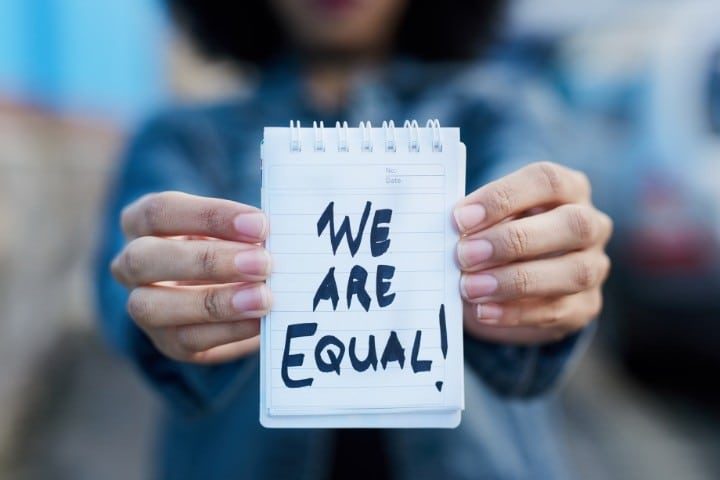
The irony of emphasizing equality of outcome is that this state can only be achieved through unjust inequality of opportunity. This is only one problem, too, with what an outside-the-box thinker might call our favorite modern heresy, Equality Dogma. This phenomenon is still intensifying in America — and if you want a taste of things to come (unless we change course), just look at Great Britain, libertarian think tank the Mises Institute warns.
Writing at Mises Wire, commentator Jess Gill tells us that while the sun might have set on the British Empire long ago, the U.K. now leads the world in a different area: It has twice as many diversity and inclusion (D&I) “professionals” per 10,000 employees as any other nation on Earth. Of course, these paid troublemakers’ existence reflects a larger problem.
“From the Equal Pay Act 1970 to the Equality Act 2010, there has been a wave of antidiscrimination legislation in Britain to turn the state into some omniscient being that can determine an employer’s intentions,” Gill explains.
Yet there can be many reasons why a business may not hire a given person, may offer another better pay, or may have a workforce not reflecting the surrounding area’s demographics (just as there’s a reason, having nothing to do with unjust discrimination, why 92 percent of workplace deaths involve men).
Regardless, whether in Britain, here in the U.S., or elsewhere, equality-oriented, anti-“discrimination” legislation establishes the government as a mind reader. Hence the great and growing number of D&I officers to help avoid government punishment or a lawsuit.
Gill then quotes author Lew Rockwell, who put the applied standard here in perspective, writing:
Imagine that the government appoints a party planner who says that you can invite or not invite whoever you want, provided that one consideration is not part of the mix: you must not decline to invite someone on the grounds of hair color. Now, it may never have occurred to you to think along these lines. But now you have to. You notice that you have no redheads attending the party, much to your alarm.
What if this fact is taken as evidence that you are discriminating? Will it? You can’t know for sure. You think again: even if no redheads are coming, this is surely not the reason why you are not inviting them. There are other factors, too many factors to name. In any case, how can the state’s party planner know what your motivations are? Isn’t it astounding that a government agency would presume to read your mind, know your heart, and discern your innermost emotions and motives?
Yet a more fundamental point should be made as well: Even if a person is exhibiting unjust discrimination, so what? Consider:
No one would deny you the right to include in or exclude from your home whomever you please, whether it’s because the person is white, black, male, a Republican, a smoker, or a coffee drinker. Why should you lose this right simply because you decide to erect extra tables and sell food or market some other product or service? It’s still your private property, paid for with your own money and created by the sweat of your own brow.
This isn’t to say such discrimination may not be immoral, only that not all immoral behavior’s eradication is a legitimate state role. People should practice good manners, too, saying please and thank you. But should this be enforced at the end of a g-man’s gun?
Gill points out that D&I professionals become activists, inveighing against alleged failings such as “transphobia” and claiming that having the best armed forces requires their going “feminist.” For sure, whether it’s D&I officers or our federal Equal Employment Opportunity Commission (EEOC, which is unconstitutional), when all you have is a hammer, everything looks like a nail. The people thus employed must continually find “invidious discrimination” and punish “transgressors” to justify their positions and salaries.
Of course, all this causes problems. For one, every “employer must constantly prepare and organize to diminish the likelihood that a complaint will be filed,” Rockwell wrote. “In doing so, they take steps that lead to inefficiencies or avoid steps that might improve efficiency.”
Yet the deeper issues, the worldview underpinning these actions, must again be examined. One problem is a fancy now a basic assumption of many: that all groups are equal in terms of worldly capacities. Yet logically following from this when seeing that groups perform differently in various worldly endeavors is that the disparate outcomes could only be the result of unjust discrimination. This enables anti-discrimination laws’ creation — the administration of a “cure” even when there’s no disease.
The kicker is that equality is completely irrelevant. Consider an example I often use:
There are two tennis centers training children. After a certain period of time at the first, all the kids are advanced beginners. After the same period at the second, some are advanced beginners; two other large groups constitute, respectively, low intermediates and intermediates; there’s a small group of advanced players; and a handful are approaching tournament caliber. At which center is there more equality?
Okay, now, at which are the children doing far better on average?
The lesson: Equality tells you nothing about quality.
Of course, some will still tout equality of opportunity under the law. Yet consider the implications. Do you really want, for example, women to be drafted into combat in times of war or 16-year-olds given the vote?
Our “equality” excesses are killing us, but nothing will change until Americans in general start questioning Equality Dogma itself.



